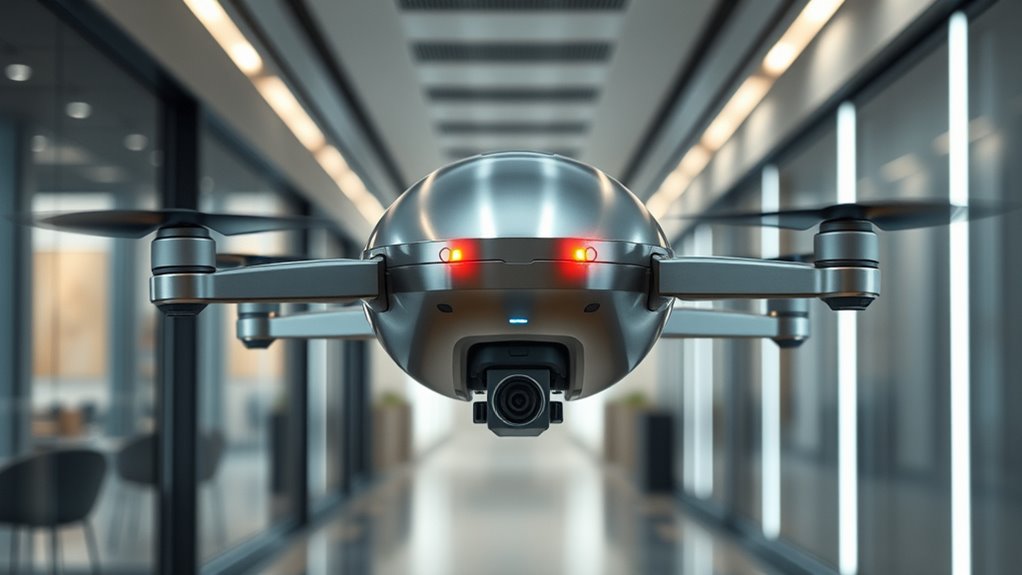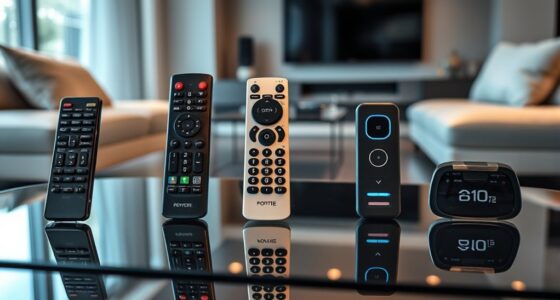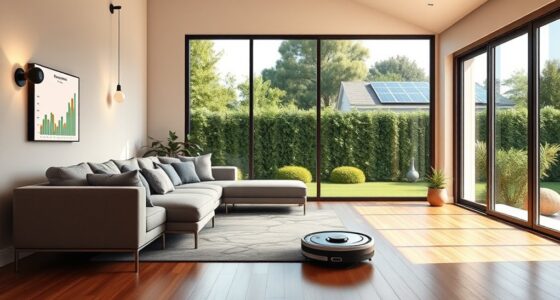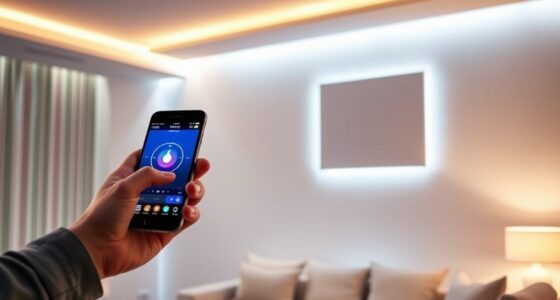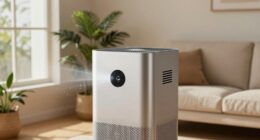Indoor drones as security guards are increasingly seen as a practical, future-focused solution. They offer real-time surveillance, quick navigation through complex spaces, and instant incident alerts, making them valuable additions to existing security systems. While ethical concerns and legal regulations must be addressed, ongoing advancements suggest they won’t be a flop for long. If you want to understand how these drones could reshape security strategies, you’ll find many factors worth considering.
Key Takeaways
- Indoor drones enhance security by providing real-time surveillance and rapid response in complex indoor environments.
- Ethical concerns, privacy issues, and legal compliance are critical factors influencing their adoption.
- Integration with existing security systems boosts overall effectiveness without replacing human security personnel.
- Technological advancements suggest potential for improved incident prevention and faster security responses.
- Regulatory frameworks and public acceptance will determine whether indoor drones become a security mainstay or a passing trend.
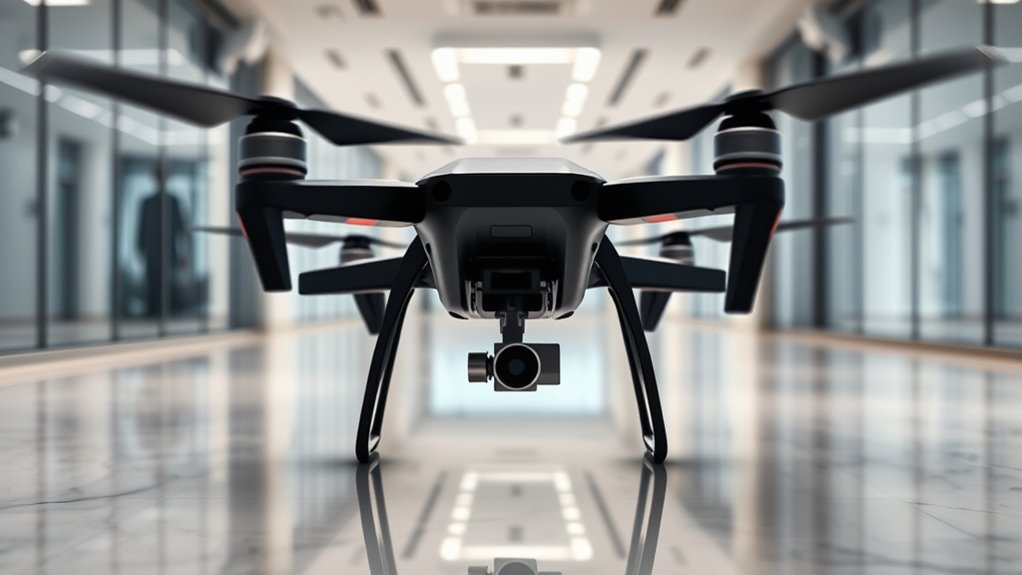
Indoor drones are transforming security by offering a flexible, real-time surveillance option that traditional guards can’t match. These flying devices can quickly navigate complex indoor environments, providing instant footage and insights that help prevent crimes or address incidents as they happen. As you consider integrating these drones into your security system, it’s essential to understand the broader implications, especially around ai ethics and drone legislation. These factors shape not only how effectively drones can be used but also how responsibly they are deployed.
Indoor drones revolutionize security with real-time, flexible surveillance, emphasizing the importance of AI ethics and legal compliance.
Ai ethics plays a fundamental role here. While drones equipped with AI can identify suspicious activity or unauthorized access, concerns about privacy and data security quickly surface. You don’t want your security tools infringing on personal privacy or operating without accountability. Ethical AI use demands transparency, bias mitigation, and strict data handling protocols. Without these, you risk damaging trust with employees, visitors, or clients—something that could ultimately undermine your security efforts. Maintaining a balance between surveillance and respecting individual rights is essential, especially in sensitive settings like healthcare or corporate environments.
Equally important is drone legislation, which varies widely depending on your location. Laws surrounding indoor drone use cover aspects like registration, operational limits, and privacy protections. Some regions have strict rules that restrict where and how drones can fly indoors, especially in commercial or high-security spaces. Staying compliant isn’t just about avoiding fines; it’s about ensuring your security measures are legally sound and ethically justified. You might need to coordinate with regulatory bodies, obtain specific licenses, or implement measures to prevent unauthorized surveillance. Ignoring drone legislation could lead to legal complications, financial penalties, or damage to your organization’s reputation. Additionally, understanding regulatory compliance for drone use can help prevent unintended legal issues and ensure smooth operation within legal boundaries.
As you adopt indoor drones, you must also consider their integration with existing security systems. They’re not a standalone solution but part of a broader security ecosystem that includes cameras, alarms, and human personnel. Drones can enhance coverage and response times, but they shouldn’t replace trained security staff entirely. Instead, think of them as force multipliers—augmenting your team’s capabilities while adhering to ethical standards and legal requirements.
Frequently Asked Questions
How Do Indoor Drones Compare to Traditional Security Personnel?
Compared to traditional security personnel, indoor drones offer automation advantages like real-time surveillance and quick response. However, you’ll face automation challenges, such as maneuvering complex environments and maintaining drone functionality. Unlike human guards, drones require ongoing maintenance, which can be costly and complex. While they can enhance security coverage, you need to weigh these factors carefully before replacing or supplementing your existing security team with indoor drones.
What Are the Privacy Concerns With Indoor Drone Surveillance?
Imagine a world where your privacy feels a bit more delicate. Indoor drone surveillance raises concerns about privacy invasion and data security, making you uneasy about constant monitoring. You might worry that sensitive activities could be unintentionally captured or misused. While drones offer enhanced security, they also challenge your right to privacy, prompting questions about how data is protected and whether such surveillance respects personal boundaries.
Can Drones Operate Effectively in All Indoor Environments?
You might wonder if drones can effectively operate in all indoor environments. While they excel in open spaces, navigation obstacles like furniture and complex layouts can challenge their sensors. Indoor acoustics can interfere with audio-based navigation or communication, reducing efficiency. Overall, drones work best in controlled environments, but their effectiveness diminishes in cluttered or acoustically challenging spaces, so they aren’t universally reliable indoors yet.
What Is the Cost Difference Between Drone Security and Human Guards?
Imagine weighing a gold bar against a stack of dollar bills—that’s a visual of cost comparison. Drones typically have higher upfront costs but lower ongoing expenses than human guards. You’ll see significant budget implications, especially over time, as drones reduce labor costs. However, initial investments can be steep, making the overall cost difference a key factor in deciding whether drone security fits your budget and long-term plans.
How Do Indoor Drones Handle Emergency Situations or Intrusions?
When it comes to handling emergency situations or intrusions, indoor drones excel in nighttime surveillance and obstacle navigation. You’ll find they quickly spot intruders, alert security, and even track movements without putting personnel at risk. Their agility allows them to maneuver through tight spaces, providing real-time visuals. This rapid response capability makes indoor drones a valuable asset in emergencies, enhancing security effectiveness and ensuring prompt action in critical moments.
Conclusion
Like Icarus soaring too close to the sun, relying on indoor drones might seem innovative but could lead to unforeseen pitfalls. While they promise a futuristic security solution, questions about reliability and effectiveness remain. Will these drones truly become our vigilant guardians, or will they fall short of expectations? Only time will tell if we’re witnessing the dawn of a new era or a flight destined to falter. Stay tuned—history often repeats itself in surprising ways.
